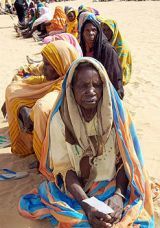Malnutrition rising in Darfur as fighting increases – UN
April 26, 2006 (GENEVA) — Malnutrition is on the rise again in Darfur, where more fighting and less money are eroding progress, the U.N. children’s fund said Wednesday.

|
|
Darfurian women wait for food supplies in the Abu Shouk. |
“We need to raise the alarm bell,” said Ted Chaiban, head of UNICEF’s mission to Sudan. “We’re losing ground. We need to stop this deterioration.
“We are seeing the beginning of what could be a reverse of the positive trend of 2005.”
Fighting between the government, its allies and the rebel movements, infighting among rebel factions jockeying for position and territory, as well as general banditry – individuals hijacking trucks, looting food, supplies and equipment – have forced a new wave of people from their homes, Chaiban said.
Unrest is also preventing access to roughly a third of all those who have been forced from their homes but remain within Sudan, and are therefore not officially classified as refugees because they haven’t crossed an international border.
“And there is the added element of lack of funding despite the fact this is seen and said to be a top priority for most donors,” said Chaiban, who said UNICEF has only received $15 million of the $89 million it appealed for in Darfur for 2006.
An additional 200,000 people have fled their homes to escape the violence over the last three months alone, putting the number of internally displaced people in Darfur at over 2 million, he said. Another 200,000 refugees are in Chad.
“In any other place that would have been front page news,” Chaiban said. “In Darfur, because there were already 1.85 million displaced people and because we’ve been at it for three years, it doesn’t register on the Richter scale.”
After huge humanitarian efforts decreased the rate of global acute malnutrition from 21.8% in 2004 to 11.9% in 2005, the number has risen again to 15% in South Darfur, he said.
“It’s starting to creep up again,” Chaiban said. “We’re seeing some trends that we have to watch and make sure don’t confirm themselves.”
UNICEF only has enough funds to sustain operations until early June.
“That means real activities that help real children are not continued,” Chaiban said.
UNICEF has already cut back or suspended funding for education, maternal and child nutrition, primary health care, and extending water systems to rural communities.
“What is clearly needed is a force on the ground that has the person power, the mandate and the logistical back up to be able to make a difference,” Chaiban concluded.
Fighting in Darfur began in February 2003 when rebels from ethnic African tribes took up arms, complaining of discrimination and oppression by Sudan’s Arab-dominated government. The government is accused of unleashing Arab tribal militia known as the Janjaweed against civilians in a campaign of murder, rape and arson.
Over 180,000 people have died in the conflict. Some three million have been driven from their homes. More than 100,000 Sudanese children under 5 died last year from malaria, diarrhea and acute respiratory infections, UNICEF said.
Tuesday, AU mediators presented their first comprehensive draft agreement to the warring Darfur parties, whose representatives have been engaged in peace negotiations in Nigeria. The AU has set Sunday as a deadline for an agreement. Seven previous rounds of talks have failed to stem the fighting.
(ST/AP)
